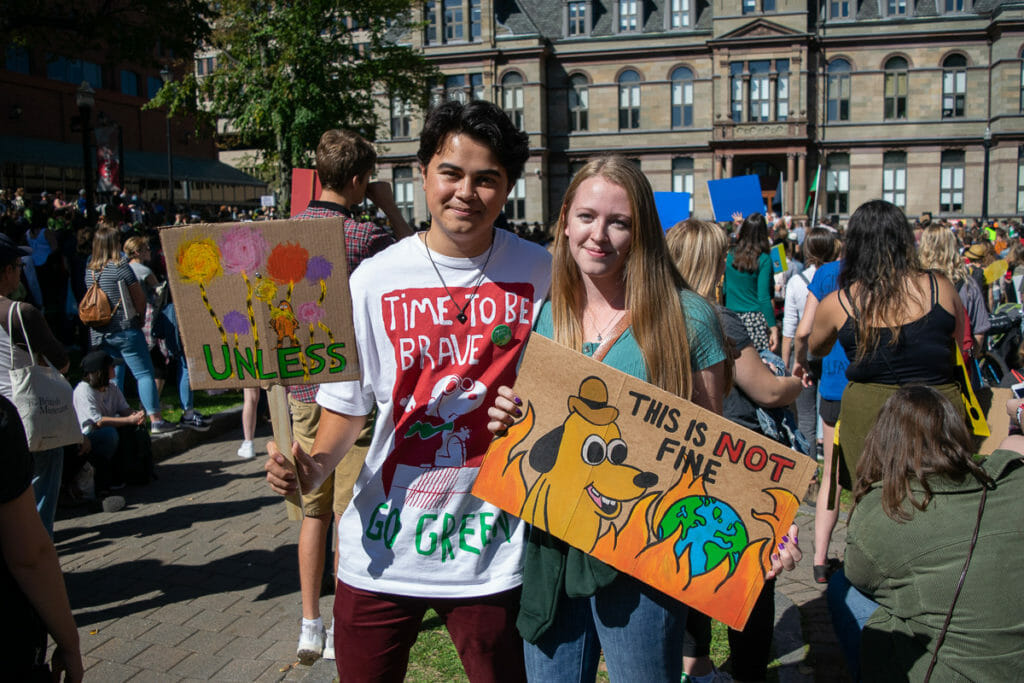
Eco-anxiety on campus
It’s not just Greta Thunberg who feels climate change’s emotional burden
Over the past two years, some students in Dalhousie’s College of Sustainability department have reported the feeling uneasy and anxious over the environment’s dire straits, a feeling which has recently been coined as “eco-anxiety.”
Georgia Klein, a professor in the College of Sustainability (SUST) says that her research has found that there are “lots and lots [of effects on] just mental health” and that climate change’s effects can also impact community health, as well as our homes and physical health.
Eco-anxiety kept third-year student Jordan Ruest up at night. She says that her brain “was constantly working” to find solutions to the terrifying realities she was learning about in the SUST program. Her knowledge brought to light the knowledge gap between SUST students and other majors, and between this generation and the ones preceding it. Growing up in a small town in Ontario, Ruest felt sheltered from the realities of climate change and talking to her parents about the source of her anxiety proved difficult.
Even those not in the SUST department report feeling similarly — I certainly have. But Taylor Warren, a graduate from the SUST program and former teaching assistant in the same department, says she still feels burnt out due to stress over climate change (despite currently pursuing a masters in the philosophy department this year). “When you look at what’s going on politically all over the world,” she said, “it can really get you down.” Warren thinks this problem is especially compounded by social media bombarding us with news of every global disaster, all-day-every-day, on multiple different platforms.

Massive burden
Klein agrees, saying that our generation suffers from being unprecedentedly exposed to these issues. She says we also must bear the “massive burden” of untangling the impossibly entangled web of problems that have led to global disaster. When faced with yet another report on the fires in the Amazon or even the aftermath of Hurricane Dorian, I have often felt the cool despondency of eco-anxiety creeping in. At such times, the abyss between those who seem to care about the future of our planet and those who have the power to take the necessary action to change it feels unbridgeable.
However, neither Klein, Ruest, nor Warren are pessimistic. In fact, the resounding tone I got from these three very different women was optimism. When I asked Klein what she did to remain hopeful against what seems to be insurmountable odds, she told me she “make[s] [her]self feel as though [she has] agency,” by breaking down the mountain of anxiety into “smaller pebbles.” We can’t stop the Trans-Mountain Pipeline, but we can help in smaller ways, such as spreading awareness, attending protests, and volunteering. We need not live in anxiety and fear over them, because that only leads to large-scale complacency.
Warren agrees, and she has found that supporting students while working as a TA in the SUST program has helped her with her eco-anxiety. She said that being a global citizen is about “holding yourself accountable to fighting for your values and for our climate while also taking care of yourself.” One of the ways she hopes to help students take care of themselves is by facilitating the “Eco-grief Meet,” a support group designed to help students cope with climate change.
Not alone
Most importantly, Eco-grief Meet gives a name to a previously anonymous issue. Ruest didn’t know what eco-grief was until she finally went to Klein for help last March. Before then, she suffered in silence because she felt as though she was “just talking about [her] feelings.” The support group Warren has founded will give voice to and thus legitimize what we’re all feeling: that our planet is burning all around us, but everyone with the power to put the flames out seems intent on watching us burn.
Spaces where we can share in our distress over ecological disaster might not stop corruption from engulfing our only home in flames but turning to others who share our grief might help us find the courage to continue to fight the fire.
The Eco-grief Meet will convene every Tuesday from 4-6 p.m. in room 2023 of the Mona Campbell Building. Please remember that you are not alone in this burning house.






